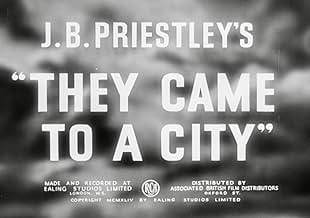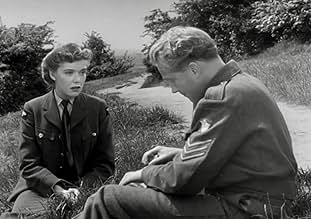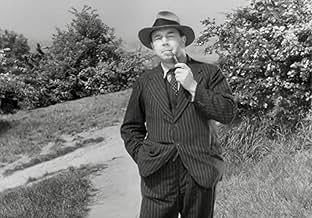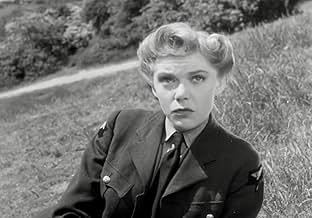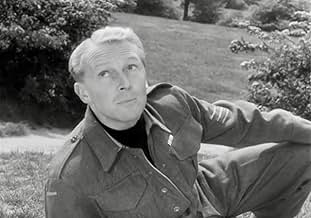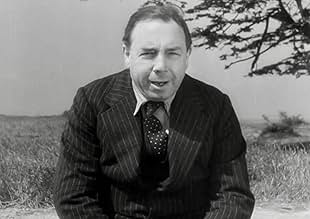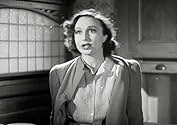Agrega una trama en tu idiomaAdapted from a J.B. Priestley play with many of the original actors. The tale of various people who have come to live in an "ideal" city and their hopes and reasons for doing so.Adapted from a J.B. Priestley play with many of the original actors. The tale of various people who have come to live in an "ideal" city and their hopes and reasons for doing so.Adapted from a J.B. Priestley play with many of the original actors. The tale of various people who have come to live in an "ideal" city and their hopes and reasons for doing so.
- Dirección
- Guionistas
- Elenco
Mabel Terry-Lewis
- Lady Loxfield
- (as Mabel Terry Lewis)
Fanny Rowe
- Philippa Loxfield
- (as Frances Rowe)
Brenda Bruce
- WAAF
- (sin créditos)
Ralph Michael
- Sergeant Jimmy
- (sin créditos)
J.B. Priestley
- J.B. Priestley
- (sin créditos)
Johnnie Schofield
- Bert the Barman
- (sin créditos)
Opiniones destacadas
The main title actually says 'J. B. Priestley's They Came to a City', and the film constitutes the second of three brief wartime flirtations with fantasy by Ealing Studios.
Coming late in the war when enlightened opinion was already contemplating what was to come next, the ideals it expressed had already found voice in the Boulting Brothers short 'Dawn Guard' and thematically owed a lot to Sutton Vane's 'Outward Bound', James Hilton's 'Lost Horizon' and Priestley's own 1937 fantasy 'I Have Been Here Before'; while the striking production design seems to show the influence of German silent cinema.
Beginning and ending with the genial figure of Mr Priestley ambling on and off, it's not for all tastes, but is certainly quite unlike any other British film before or after.
Coming late in the war when enlightened opinion was already contemplating what was to come next, the ideals it expressed had already found voice in the Boulting Brothers short 'Dawn Guard' and thematically owed a lot to Sutton Vane's 'Outward Bound', James Hilton's 'Lost Horizon' and Priestley's own 1937 fantasy 'I Have Been Here Before'; while the striking production design seems to show the influence of German silent cinema.
Beginning and ending with the genial figure of Mr Priestley ambling on and off, it's not for all tastes, but is certainly quite unlike any other British film before or after.
Not exactly highly entertaining but it's not supposed to be entertaining as it's a comparison of posh rich people to poor ones.
Unsurprisingly the rich posh ones are not keen on a society where all are equal so the privileged positions that they currently enjoy would be lost. Eighty years later and nothing has changed as the rich continue to get richer and the poor get poorer.
My favourite character was the washerwoman who held the film together with her comments.
The set must have been very cheap to construct as it seemed to have been made of plywood painter to resemble stone.
Worth a watch but don't expect any excitement like a car chase for example.
Unsurprisingly the rich posh ones are not keen on a society where all are equal so the privileged positions that they currently enjoy would be lost. Eighty years later and nothing has changed as the rich continue to get richer and the poor get poorer.
My favourite character was the washerwoman who held the film together with her comments.
The set must have been very cheap to construct as it seemed to have been made of plywood painter to resemble stone.
Worth a watch but don't expect any excitement like a car chase for example.
Lovely piece about assorted people who discovered a happy land far far away - and some found it happier than others. But as noted elsewhere, the Utopia is portrayed without any explanation of how we got there. As another reviewer says, it captured the mood of the times. That mood produced the Attlee government - and after six years of it, it took another 13 before Labour got in again - and Harold Wilson had the sense not to promise Utopia. Unfortunately, The comparison with Lost Horizon is very apt, but Shangri-La doesn't work without it's supernatural elements - which unfortunately we don't possess.,
A very pleasant surprise. This is an allegory about an imagined socialist paradise, and the judgements that various archetypical citizens would have of it. I Loved it.
It happens that I watched this - on FUBI - on the same night that I watched a documentary about Jane Jacobs, the sociologist of cities and advocate of bottom-up community building. This was a perfect follow up.
It's presented as a series of exchanges between the disparate characters, contrasting their values, experience and social orientation. While it could be criticized as didactic and predictable, I found it well executed and fun. I especially loved Googie Withers as the working class gal whose been around the block a few times but isn't ready to go cynical.
In tone and flavor it's like a blend of Capra with Powell & Pressburger.
It happens that I watched this - on FUBI - on the same night that I watched a documentary about Jane Jacobs, the sociologist of cities and advocate of bottom-up community building. This was a perfect follow up.
It's presented as a series of exchanges between the disparate characters, contrasting their values, experience and social orientation. While it could be criticized as didactic and predictable, I found it well executed and fun. I especially loved Googie Withers as the working class gal whose been around the block a few times but isn't ready to go cynical.
In tone and flavor it's like a blend of Capra with Powell & Pressburger.
Based on J. B. Priestley's play, 9 characters from wildly different social backgrounds disappear into the dark one night and arrive at a vast structure which has an entrance to a new, never seen, city. Each of the 9 enter and then decide whether this apparent Utopia is for them or not.
Strange, wordy piece making little attempt to hide its stage origins. This was intended to look at Britain towards the end of the war and how as a society it was to land in its feet. Regrettably, Priestly, who appears briefly, clearly has decided which characters and classes are the good guys and which are the bad. So whilst there are certainly some interesting characters and ideas here, this rather didactic lecture makes it clear that the hard working, poorer and the left wing seeking the searches for Utopia are all right and the right wing are all upper class idiots frightened of change and only interested in money. It's all far too black and white with too many cliched characters and political speeches, particularly by free thinking revolutionary Dinmore played by John Clements who cries for change eloquently whilst the upper classes mumble and moan. It's a pity, because it's a fun idea and with a gentler touch and perhaps more ambiguity it could have been more interesting than it is. An intriguing but not wholly successful cinema oddity.
Strange, wordy piece making little attempt to hide its stage origins. This was intended to look at Britain towards the end of the war and how as a society it was to land in its feet. Regrettably, Priestly, who appears briefly, clearly has decided which characters and classes are the good guys and which are the bad. So whilst there are certainly some interesting characters and ideas here, this rather didactic lecture makes it clear that the hard working, poorer and the left wing seeking the searches for Utopia are all right and the right wing are all upper class idiots frightened of change and only interested in money. It's all far too black and white with too many cliched characters and political speeches, particularly by free thinking revolutionary Dinmore played by John Clements who cries for change eloquently whilst the upper classes mumble and moan. It's a pity, because it's a fun idea and with a gentler touch and perhaps more ambiguity it could have been more interesting than it is. An intriguing but not wholly successful cinema oddity.
¿Sabías que…?
- TriviaFinal film of Mabel Terry-Lewis.
- Citas
Alice Foster: I never thought there *could* be a place as good as this.
- ConexionesFeatured in Sosialismi (2014)
- Bandas sonorasMusic selected from The Divine Poem
Music by Aleksandr Skryabin (as Scriabin)
Played by The London Philharmonic Orchestra
Conducted by Ernest Irving
Selecciones populares
Inicia sesión para calificar y agrega a la lista de videos para obtener recomendaciones personalizadas
Detalles
- Tiempo de ejecución1 hora 18 minutos
- Color
- Relación de aspecto
- 1.37 : 1
Contribuir a esta página
Sugiere una edición o agrega el contenido que falta

Principales brechas de datos
By what name was They Came to a City (1944) officially released in India in English?
Responda
